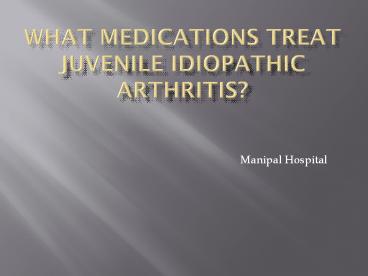What Medications Treat Juvenile Idiopathic Arthritis? - PowerPoint PPT Presentation
Title:
What Medications Treat Juvenile Idiopathic Arthritis?
Description:
Nearly three hundred thousand children, from infants to teenagers in the United States alone suffer from some sort of arthritis. – PowerPoint PPT presentation
Number of Views:34
Title: What Medications Treat Juvenile Idiopathic Arthritis?
1
What Medications Treat Juvenile Idiopathic
Arthritis?
- Manipal Hospital
2
- Nearly three hundred thousand children, from
infants to teenagers in the United States alone
suffer from some sort of arthritis. - Juvenile idiopathic arthritis (JIA) is the most
common type of arthritis among the children. - The meaning of the term idiopathic is - "unknown
origin." It was previously known as Juvenile
rheumatoid arthritis or JRA. - However, current researches indicate a genetic
side to Juvenile idiopathic arthritis. Some
researchers in the field are of the view that a
trigger like a virus can start the disease in a
child who has got this genetic tendency.
3
NSAIDS or Nonsteroidal anti-inflammatory drugs -
- These medications like ibuprofen (Motrin,Advil
and others) and naproxen help to reduce pain and
swelling. The side effects of these medicines
include stomach upset and liver problems. - When NSAIDs fail to cure the symptoms of swelling
and pain, doctors prescribe these medications.
They may also be taken in combination with
DMARDs. - Some commonly used DMARDs for children are
methotrexate (Trexall) and sulfasalazine
(Azulfidine). Side effects include nausea and
liver related problems. - Since JIA is caused by overactive immune system,
medications that suppress immune system are used
in treatment of Juvenile Idiopathic Arthritis.
Some common medicines that are administered
include abatacept (Orencia), rituximab (Rituxin),
anakinra (Kineret) and tocilizumab (Actemra).
These medicines increase the risk of infections
and cancer.
4
Tumor necrosis factor (TNF) blockers -
- Etanercept (Enbrel) and adalimumab (Humira) are
TNF blockers that help to reduce pain, swollen
joints and morning stiffness. - Just like immune suppressants these medicines
increase the risk of having infections and some
mild cancers like lymphoma. - Medicines like prednisone may be used to prevent
inflammation of the sac around the heart and
other complications - Corticosteroids can be administered either by
mouth or directly into a joint with the help of
an injection. - The side effects of these medicines include
increase in susceptibility to infection and
interference in normal growth. It should be used
for the shorted possible duration. - In addition to the medications, the doctors will
recommend the child to be consulted with a
physical therapist to help in keeping the joints
flexible and maintain the muscle tone. - The physical therapist will suggest any
protective equipment that may be necessary along
with the best exercises. - In rarest cases a surgery may be performed to
improve the position of joint for a child
suffering from Juvenile Idiopathic Arthritis.
5
Pediatric Infectious Diseases And Its Treatments
-
- Infectious diseases are disorders caused by
organisms such as bacteria, viruses and fungi. - Though families take utmost care and precaution
in the upbringing of a child, sometimes certain
infectious diseases may develop which needs to be
diagnosed by a pediatric who specialises in
dealing with infectious diseases in children.
6
Pharyngitis
- Pharyngitis is an infection which leads to the
inflammation of pharynx, situated in the back of
the throat. - It is more commonly referred to as sore throat.
Pharyngitis may also cause scratchiness and
difficulty in swallowing. - Drinking plenty of fluids and eating warm broth
can help relieve the symptoms. Resting and
gargling with warm water also helps to cure it. - In certain cases antibiotics maybe prescribed by
the doctor.

